Former Foster Children Tell How They Became Orphans
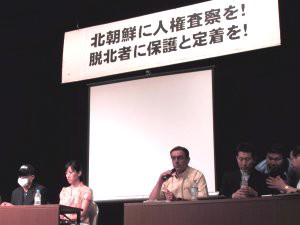
Photos of the 3-Day Conference
Grace Yoon, whose father was arrested by the Chinese authorities on May 9, 2005 while attempting to help North Korean refugees, addressed the group.
Because of the prejudice still faced by North Koreans living in South Korea, two of the children have requested that we not show their photos.
The 3 Former Foster Children Are:
1. Lee Yong Ae (female, born 1987)
Born in Musan city, North Hamgyong province, North Korea. When her mother and father both died, she escaped into China, because she had heard rumors that food was more plentiful there.
In 1998, at age 11, she was found and put under the protection of LFNKR by one of our local shelter workers. She started school in Yanbian, the Korean Chinese autonomous region of China under our group’s foster parent program.
In spring of 2002, she was arrested during a raid by Chinese authorities and sent back to North Korea. However, later that same year, she managed to escape once again, and returned to the protection by LFNKR.
In 2003, we escorted her secretly out of China, to South Korea via a lengthy and hazardous route.
2. Lee Gwang-Ryon (male, born 1988)
Born in Hesan city in Yangang province, North Korea.
His father died following a serious leg injury in an accident. Shortly after that, his mother disappeared. He went to China, looking for food.
In 1998, at age 10 he was found and brought to an LFNKR shelter by one of our local workers, where he received the basic necessities, including education, under our foster parent program. He quickly learned Chinese.
But in the spring of 2002, at age 14, he was arrested in a raid by Chinese police and sent back to North Korea. He was sentenced to hard labor, but later that year he managed to escape once again and returned to an LFNKR shelter.
When he reached the shelter, he required hospitalization because of his injuries and extreme exhaustion.
In 2004, after considerable delay, he finally reached South Korea, where he was reunited with the other foster children from his group.
3. Oh Chun-song (male, born 1988)
Born in a coal-mining town in North Hamgyong province.
When both his parents starved to death, he made his way to China seeking food.
He was found by a local LFNKR worker, and he began classes in Yanbian under our group’s foster parent program.
In the spring of 2002, he was arrested in a raid by Chinese authorities and sent back to North Korea. But that same year he managed to escape and returned to the shelter.
In 2003, LFNKR secretly escorted him out of China to South Korea via a dangerous and roundabout route.
During the escape, a guard at the check point of a third country stopped him, but he managed to talk his way past the security guards and made it through the gate on his second try.
Interviewed for Television
On August 1, Japan’s Asahi Television aired a 16-minute segment featuring one of the three children, Lee Gwang-Ryon (now 17), and his Japanese foster mother (Chizuko Yamashita, a founding member of LFNKR).
A streaming video version of the feature is available online. It is all in Japanese, but you can view it by clicking here.
~ Second Day ~
Seoul Train Documentary
August 1, 2005
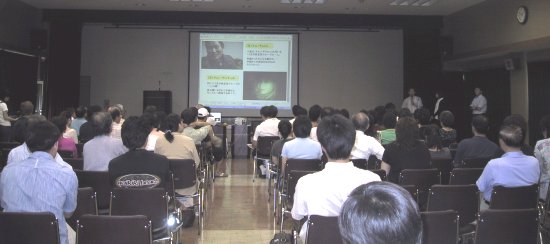
Screening of the Japanese version of “Seoul Train,” the award-winning documentary, was followed by a panel discussion. LFNKR translated the original English into Japanese subtitles.
FNKR issued tickets for this event priced at 1,000 yen (about $10), and nearly 100 people attended.
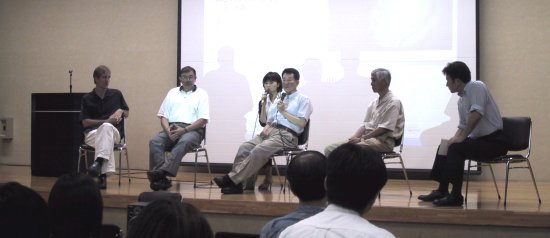
Screening of the 54-minute “Seoul Train” documentary was followed by an enthusiastic question and answer session that continued for nearly 2 hours.
Panel members included (from left to right) Jim Butterworth, producer-director of “Seoul Train”; Tim Peters, Christian activist and founder of Helping Hands Korea; Chun Ki-won, South Korean activist and Director of Durihana Mission; Kato Hiroshi, Secretary-General of LFNKR; and Noguchi Takayuki, LFNKR member.
After the screening, one of the Waseda University students inquired about screening the Japanese version of the film at their university.
~ Third Day ~
IPCNKR Meeting
August 2, 2005
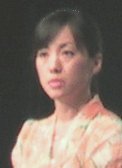
Grace Yoon told legislators and NGO members from several countries about her father, Rev. Phillip Jun Buck.

Rev. Phillip Jun Buck, a minister and humanitarian aid worker, aged 68, is now being detained in China. His daughter is working tirelessly for his release.
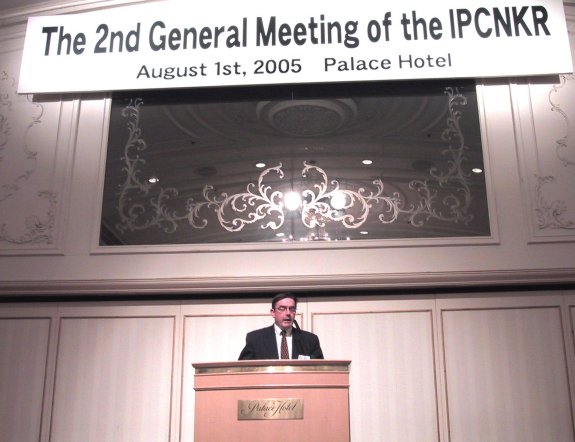
Tim Peters (Helping Hands Korea) discussed the plight of NK refugees and the humanitarian aid workers who are still being detained in Chinese prisons. One of these aid workers is Choi Yong-hun, now in prison in Yantai, China. He has now served more than two-and-a-half years of his 5-year sentence. All the lawmakers attending from four nations signed petitions demanding release of Choi Yong-hun and An Chung Hak, who are imprisoned in China.
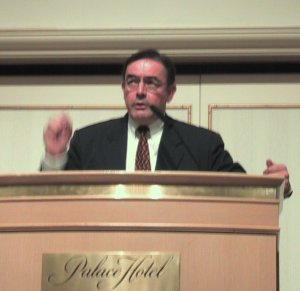
Tim Peters also related the most recent incident with which he was involved.
He explained that embassy officials of his own country (the USA) had declined his request that they support his efforts to help a 17-year old North Korean refugee hiding in a shelter in China under particularly precarious conditions.
The father of the teen refugee had been an officer in the NK army, and when the family was arrested in China and repatriated to North Korea, the father was immediately executed without trial. The mother was sent to a labor camp, and the two daughters (ages 14 and 17) were released, only to bravely risk their lives by crossing to China again. The younger of the two daughters was picked up by Chinese police & repatriated, and the older sister runs the risk of being trapped into human trafficking if not rescued soon.
Peters sharply criticized the yawning gap between the spirit of the North Korean Human Rights Act of 2004 and the actual behavior of State Dept. employees in diplomatic missions in China, which he characterized as timid and overly fearful of offending the host government of China.
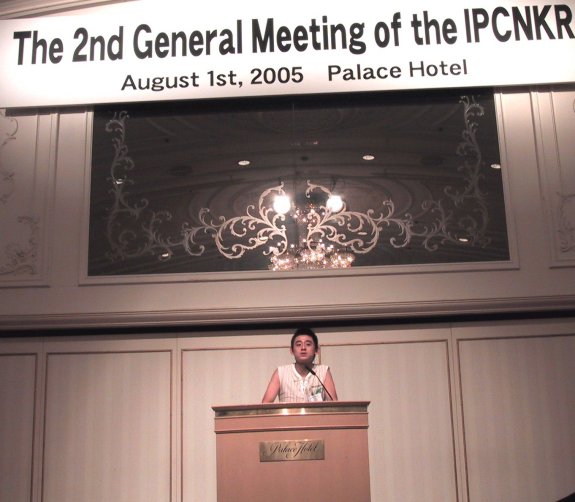
One of LFNKR’s former foster children talks about his experiences while in hiding in China, and his current life in his new home in South Korea.

Jim Butterworth, producer-director of “Seoul Train” speaks following the screening of the Japanese version of his documentary.






